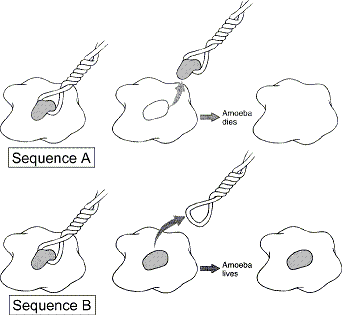The chromosomes have arrived at opposite poles during
a. anaphase.
b. metaphase.
c. interphase.
d. prophase.
e. telophase.
e
You might also like to view...
Why is energy required for nutrient transport? Give an example of a system that transports nutrients and describe what source of energy is used to move the nutrients into the cell
What will be an ideal response?
A blastomere is a ________ and a blastocyst is ________.
A) fetal organ produced by cleavage; an embryonic organ produced by cleavage B) fetal membrane; an embryonic membrane C) cell produced by cleavage; a hollow ball of cells D) solid ball of cells; three-layered embryo
Sequence A in Figure 1-1 represents:

a. a hypothesis.
b. the experimental group.
c. the control group.
d. a sampling error.
e. a deduction
Use the table to answer the corresponding question(s)
Species Pairs Percent Divergence in a Selected DNA Sequence Human?chimpanzee 1.7 Human?gorilla 1.8 Human?orangutan 3.3 Human?gibbon 4.3 Human?rhesus monkey (Old World monkey) 7.0 Human?spider monkey (New World monkey) 10.8 Human?tarsier 24.6Based on the data in Table 18-1, which of the following primates is the most distantly related to humans? a. chimpanzee b. gorilla c. rhesus monkey d. gibbon e. orangutan